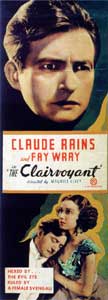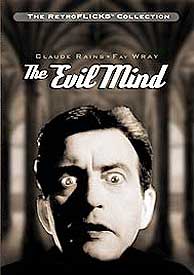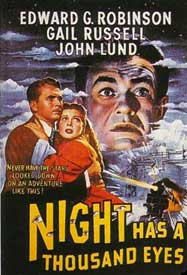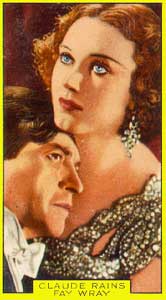 The Evil Mind (1934) is based on Austrian novelist Ernest Lothar's best selling weird novel Clairvoyant (1932), & released in England under the novel's title. It's a well acted & a decent enough story. Claude Rains is the caped mentalist Maximus. Fay Wray is his stage assistant Rene. Their act is just a trick until one evening Max really begins to display psychic powers. The Evil Mind (1934) is based on Austrian novelist Ernest Lothar's best selling weird novel Clairvoyant (1932), & released in England under the novel's title. It's a well acted & a decent enough story. Claude Rains is the caped mentalist Maximus. Fay Wray is his stage assistant Rene. Their act is just a trick until one evening Max really begins to display psychic powers.
The power comes over him only the presence of Miss Christine Shawn (Jane Baxter), which takes him some while to realize. He saved a very few lives (but many others were lost) by predicting a train disaster, bringing him an unexpected boost of fame that gets his act booked into the London Paladium for three hundred pounds a week.
 Unable to live up to the expectation of being able to prophesize the future, he's on the verge of having his contract at the Paladium cancelled. But then Miss Shawn, a reporter, shows up in a timely manner & in her presence Max predicts a hundred-to-one race horse win which gains big public notice. It's also the beginning of Rene's justified jealousy of Christine, who begins to hang around Max constantly due to the psychic connection between them which they barely recognize. Unable to live up to the expectation of being able to prophesize the future, he's on the verge of having his contract at the Paladium cancelled. But then Miss Shawn, a reporter, shows up in a timely manner & in her presence Max predicts a hundred-to-one race horse win which gains big public notice. It's also the beginning of Rene's justified jealousy of Christine, who begins to hang around Max constantly due to the psychic connection between them which they barely recognize.
Max's mother (Mary Clare) on her dying breath tells Rene that Max inherited his power from his father, that it works only in the presence of another individual who functions as a psychic battery, & the power is invariably evil & must be given up. Max is at first convinced by Rene & by his mother's deathbed wish to cut off all connection with Christine & stop predicting the future.
[SPOILER WARNING] But he has grown accustomed to success, & when next Christine is near, he envisions a nearby tunnel disaster & comes to believe he can save hundreds of lives, so must not give up his power. He hurries to warn the workers in the tunnel project that there's going to be a major cave in. Though he's not believed, the miners become fearful & careless, resulting in human error & catastrophe.
Max finds himself arrested for having performed another "promotional stunt" for his stage act which was the direct result of the accident he "predicted." It's also revealed that his first "miracle" of stopping a train to get off before an accident occurred was the cause of the train being off schedule, & there would've been no collision if he hadn't stopped the train. Too late he realizes he should never have succumbed to his "gift" which his mother warned him against. [END SPOILER WARNING]
A somewhat out of place happy ending is tacked on, but the film isn't spoilt by it, & The Evil Mind remains an effective minor thriller.
 Night has a Thousand Eyes (1948) is so similar to The Evil Mind that it's hard to believe they're not based on the same source, but this Edward G. Robinson vehicle is based on a classic "weird mystery" novel by Cornell Woolrich. Night has a Thousand Eyes (1948) is so similar to The Evil Mind that it's hard to believe they're not based on the same source, but this Edward G. Robinson vehicle is based on a classic "weird mystery" novel by Cornell Woolrich.
Robinson is carnival mentalist John Triton, whose act is a trick until one day he acquires the ability to actually foresee the future. It's hard to cope with his newfound powers since the majority of the things he sees are horrible.
To forestall these tragedies requires actions that are injurious to his own happiness, as when he envisions his fiance's troubles with childbirth & so breaks off the engagement to save her, making everyone unhappy.
Triton begins to feel acutely isolated in the world, & the police begin to wonder if he isn't some sort of maniac who makes predictions that he personally sets out to make sure come true.
As in The Evil Mind, if often seems as though the catastrophes he predicts would not have occurred if he hadn't attempted to intervene. Very unlike The Evil Mind, there is no happy ending to be tacked onto the end, & it's doom & gloom until the very end. The film noir photography & grimness of the tale make it a winner.
copyright © by Paghat the Ratgirl
|


 Unable to live up to the expectation of being able to prophesize the future, he's on the verge of having his contract at the Paladium cancelled. But then Miss Shawn, a reporter, shows up in a timely manner & in her presence Max predicts a hundred-to-one race horse win which gains big public notice. It's also the beginning of Rene's justified jealousy of Christine, who begins to hang around Max constantly due to the psychic connection between them which they barely recognize.
Unable to live up to the expectation of being able to prophesize the future, he's on the verge of having his contract at the Paladium cancelled. But then Miss Shawn, a reporter, shows up in a timely manner & in her presence Max predicts a hundred-to-one race horse win which gains big public notice. It's also the beginning of Rene's justified jealousy of Christine, who begins to hang around Max constantly due to the psychic connection between them which they barely recognize.